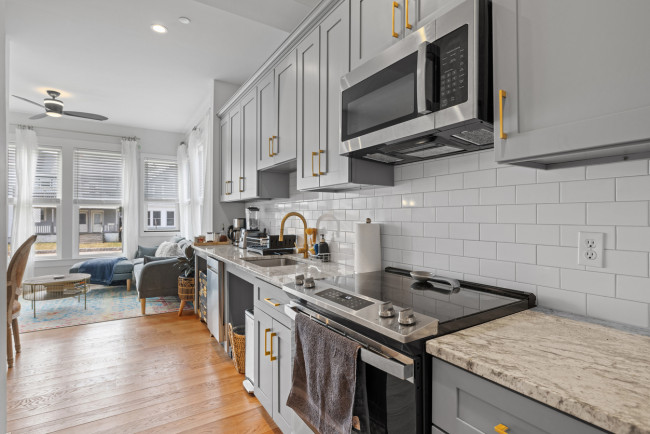Moving to NYC after college? Here's how to find a rental apartment
- You may need a temporary place to stay while you search, for example a friend's couch
- Take time to research different neighborhoods online—and ideally explore them in person
- Show up for apartment tours with your documents in hand so you can apply on the spot

Splitting the rent with a roommate? It's a good idea to discuss expectations regarding budget, cleanliness, and socializing at home before moving in together.
StefaNicolik via Getty Images
New York City has long been a popular landing place and launch pad for recent college grads, so if that's your plan, know that you will face lots of competition for apartments. Of course, it's not just recent graduates who are combing listings for a place to live in NYC—you are also competing with other newcomers who may be more established in their jobs.
And NYC landlords are by no means desperate for tenants. Rents continue to hit new records, concessions like free months are rare, and applications from multiple hopeful renters and even bidding wars are the norm. Yes, you read that right—there are bidding wars for rentals.
But apartment hunters will see a major upfront cost removed if the broker fee law goes into effect as expected this summer, making landlords responsible for paying brokers' commissions.
[Editor’s note: A previous version of this story ran in April 2024 and has been updated with new information for April 2025.]
Regardless of the type of rental you want, you can improve your chances of scoring an apartment by getting your paperwork in order and doing some online reconnaissance on where you want to live before you hit the pavement. Here's how to do all of that.
What it takes to qualify for a rental
Let's get this one out of the way: It is not easy to qualify financially for a standard rental apartment in NYC. The bar is set higher than perhaps in any other city.
For starters, most landlords require that your annual earnings equal at least 40 times the monthly rent, which can be a tall order on a postgrad's salary. That means you (and any roommates) need to make at least $80,000 per year to qualify for an apartment that rents for $2,000 a month.
You'll also need a good credit score, generally 680 or higher. On this front, make sure your name has been removed from any utility bills associated with your former college housing, so your credit isn't affected by any delinquency after you move out.
If you or your roommates don't collectively meet these qualifications, you might need what's known as a guarantor—a financially stable party (usually a parent) who guarantees to the landlord that they will pay the rent if you don't. In addition to minimum credit scores, guarantors are usually required to have an income of at least 80 times the rent (so they can pay your rent and their own housing expenses), and many landlords insist that they live within the tri-state area (New York, New Jersey, or Connecticut). That proximity makes it easier for them to collect money should things go south.
If you don't have someone who's willing or able to act as a guarantor (or if one qualifying parent is reluctant to act as the guarantor for you and your roommates; more on this nuance below), services such as Insurent and The Guarantors will act as guarantors for a fee.
Looking for a smooth experience from experts in New York City moving? Get a fast quote and reserve a move date with our fully insured partner, Big Apple Moving.
What if none of these solutions is an option? Get creative: Consider a sublet or a room in someone else's apartment rather than signing a new lease. You could also look for jobs that offer free or reduced rent.
Navigating the roommate situation
Unless you're starting a lucrative banking gig right out of college (lucky you), chances are you'll need some roommates to help pay the rent.
If you’re apartment hunting with a roommate, Kathleen LaMagna, an agent at Compass who has helped many college grads find their first NYC apartment, recommends having a frank conversation about expectations, lifestyle choices, and finances.
"It's important that everybody is on the same page (including guarantors) before you start your search. Otherwise, unanticipated differences in expectations could lead to the demise of roommate arrangements," she said.
You should definitely discuss the budget along with things like cleaning tasks as well as smoking and socializing at home. For other important conversation topics, check out “The 21 best questions to ask potential roommates.” And these websites are a good place to start your search.
Bear in mind that renting an apartment with roommates will also affect your guarantor situation.
"Parents think that when they sign on as a guarantor, it's similar to living in a dorm, where they're only guaranteeing their child's portion of the cost," LaMagna said. "But the truth is that when you sign on as a guarantor, you sign on to guarantee the entirety of the lease."
Some—but not all—landlords are willing to take multiple guarantors, which can help even out the risk. Pooling funds together to pay for a single institutional guarantor can also be a good solution. If you plan to use guarantors, you and your roommates should have a frank discussion with everyone involved about what the financial responsibility will be, and how much everyone is willing to take on.
And it's always smart to get your own renter's insurance policy.
Avoid the complications of guarantors completely when you opt for a flexible furnished rental apartment from Blueground. With fully equipped apartments, they never require guests to use a guarantor or cosigner! Plus, it’s a simple, hassle-free process to find and book your new home with Blueground.
Handling the apartment search
Although you might feel pressure to get a jump on apartment hunting, don't expect to find one too far in advance. NYC is a fast-moving market, and most landlords don't list available apartments until about a month before they are available. You can start browsing listings early to get a sense of what's out there and what neighborhoods you can afford, but don't expect to find your future apartment any earlier than a month before the move-in date.
"Generally, I always tell college grads to start looking 30 to 45 days before they need to move," said Lisa Li Moye, a broker at Corcoran. "So if you need a place by June 1st, start in mid-April."
Broker fees are going away
In case you're not aware: NYC apartment hunters are about to catch a big break when broker fees become the responsibility of landlords (in most situations).
The City Council passed in November 2024 the Fairness in Apartment Rental Expenses (FARE) Act. This law shifts the burden of paying agents to the landlords who hire them—reducing a major upfront cost to renters. Rents may become a little higher as a result, but the extra cost is spread out over the term of the lease.
Since a standard broker's fee is 12 to 15 percent of the entire year's rent, this is a major change. Despite a challenge by the powerful real estate lobby, the Real Estate Board of New York, the law appears to be on track to take effect in June.
Bear in mind a scenario where you could still be on the hook for paying a broker's fee: If you're new to the city and ask a broker to show you different neighborhoods and take you to lots of listings. There's still a lot of merit to this practice because brokers know the NYC market well and can tailor the search to your budget. They can help you put together a successful application, too.
Finding an apartment in NYC
You may be wondering how to land an apartment before you even land here. Lots of newcomers rent apartments based on listing photos and videos, but beware of fake listings or other pitfalls (like an illegal bedroom with no windows). Some photos are exceptionally, and often deliberately, deceiving. If at all possible, make at least one trip to the city to scope out places—or entrust a friend or relative who lives nearby to do this on your behalf.
Barring that, it’s wise to have an intermediary housing solution when you arrive, be it a legitimate Airbnb, a friend’s couch, or an extended-stay hotel. Short-term rentals are also available, though you’ll want to beware of scams. Don't be daunted by the short timeline—it will take work, but finding an apartment within the span of a single weekend is not only possible but common.
If you're looking for a new place with roommates, avoid divvying up the apartment viewings. "You don’t want to have one roommate coming in, securing an apartment, and then it turns out the other one doesn’t like it," said Melaine Lessey, a broker at LL Real Estate Services.
"There is an increased demand for rentals during spring and early summer as a result of recent college graduates relocating for work. Be prepared to act quickly once you have located an apartment and have all your documents already uploaded and ready to submit," she said.
Another tip: Remember to play it smart when you're scheduling appointments to look at apartments. If something seems off about an apartment or an agent, go with your gut. Meet the agent in a public place, take a friend to an open house, and never put down any money without seeing the apartment first. For tips on spotting scams and fake listings, check out "How to tell if a NYC rental listing is too good to be true."
| How to move to NYC after college | |
|---|---|
| Qualifying for a rental |
|
| Searching for apartments |
|
| Applying for an apartment |
|
Calculating how much you’ll pay
Sometimes, in an effort to entice potential renters, landlords or management companies will advertise one or two months' “free rent” with a lease signing. Some landlords spread the discount over the term of the lease in what's called the net effective rent or the advertised rent, but the net effective rent is less than the amount you will actually have to pay—known as your gross rent—during your non-free months.
Be clear on what you’ll actually pay each month by using the Brick Underground Gross Rent Calculator, below. Simply input the net effective rent, the length of the lease, and the number of free months being offered.
Some New York City landlords offer a free month (or more) at the beginning or end of a lease. The advertised rent is the net effective rent. The net effective rent is less than the amount you will actually have to pay --- known as your gross rent --- during your non-free months. Brick Underground's Gross Rent Calculator enables you to easily calculate your gross rent, make quick apples-to-apples comparisons between apartments and avoid expensive surprises. All you'll need to figure out your gross rent is 1) the net effective rent, 2) the length of your lease, and 3) how many free months your landlord is offering. [Hint: Bookmark this page for easy reference!] To learn more about net effective versus gross rents, read What does 'net effective rent' mean?. If the landlord is offering partial months free, enter it with a decimal point. For example, 6 weeks free rent should be entered as 1.5 months.Brick Underground's
Gross Rent Calculator
What's this?
You should also be aware that due to new laws passed in 2019, landlords cannot ask for money in excess of the first month's rent and one month's security deposit, Moye said.
Picking a neighborhood
Almost as important as the apartment itself, the neighborhood you end up living in can make or break your experience as a New Yorker.
Tap your social networks to learn where your contacts live and what they like or don’t like about the area. You can also lean into Brick Underground's extensive intel, including “15 things real New Yorkers look for in a new neighborhood.”
It’s also important to consider practical matters, notably transportation.
"I recommend that graduates decide which train they need to be close to," Moye said. "What's most convenient for work, grad school, whatever they decide to do. Figure out the easiest way to get to where you need to go—for instance, don't move to the Upper East Side if you know you'll be working in Chelsea."
Unless money is no object, rents also likely play a big role in where you end up living, so start cruising listings in your price range and take note if the majority of them seem to be popping up in the same few neighborhoods.
"Do your research online, then spend a good day going to different neighborhoods you think you might be interested in to see how you feel in each space," LaMagna said.
Besides transportation, factor in conveniences such as grocery stores, drug stores, banks, restaurants, and the nightlife scene, if that’s important to you. For stats on things like crime, pests, and general cleanliness, it also doesn't hurt to do some online research.
Don't forget to also do some research on the building and the landlord. Here are ways to start your sleuthing on the neighborhood in general and the building in particular.
Considering the co-living option
If you don’t mind having roommates, and find the idea of tracking down an apartment, furnishing it, setting up utilities, and all the myriad parts that go into renting here especially daunting, you might consider co-living.
Not familiar with the concept? Think of co-living arrangements as a grown-up version of dorm-style living, where you can typically pay one flat fee for a bedroom in a shared, furnished apartment, inclusive of utilities and other amenities. Social programming and events are often included in co-living arrangements—which can be a bonus if you're new to the city and don't know a lot of people.
Keep in mind there are some gray legal areas to apartment sharing. This article breaks down what you should know to protect yourself.
Putting in your application
Landlords will expect you to hand over a lot of paperwork when you apply for an apartment. Here's a full list of required documents, but generally, expect to provide a copy of a photo ID; two of your most recent pay stubs or, if you're just starting a job, a letter of employment; your last two years of tax returns; three months' worth of bank statements; proof of other funds like stocks; and personal reference letters. Your roommates will need to have all this information handy, too, as will any potential guarantors.
It's best to have all that paperwork assembled and ready to go before you even start your search because apartments get snapped up quickly, and you'll want to submit an application on the spot if you see a place you like.
"I advise my clients to organize and combine all their documents into one pdf, which can be easily done using Adobe Acrobat," Lessey said. This way, you can readily print or attach that one file to streamline the process.
Know that the 2019 changes to the rent laws capped rental application fees at $20. However, if you rent in a condo or co-op, you can be charged higher fees.
Preparing for move-in day
Once you've locked down your lease and have a moving date in mind, it's time to secure the movers or a U-Haul, as they tend to get booked up at busy times. The weekend before the first of the month, the day when many leases start, tends to be the most popular time to move. You may also get a lower rate if you book in advance.
If you're using movers to transport your belongings from another city, it's usually cheaper to hire someone from your origin city rather than a New York-based company. Otherwise, know how to get the best rate from a local moving company.
Double-check to see if your new building has any particular move-in policies. For example, some elevator buildings will only allow move-ins during weekdays between 9 a.m. and 5 p.m., to minimize inconveniencing other tenants.
One last word to the wise: Moving scams have been known to happen in NYC, so if anyone asks you to pay for the entirety of the move upfront, find a different company.
—Earlier versions of this article contained reporting and writing by Virginia K. Smith and Emily Myers.
You Might Also Like






























